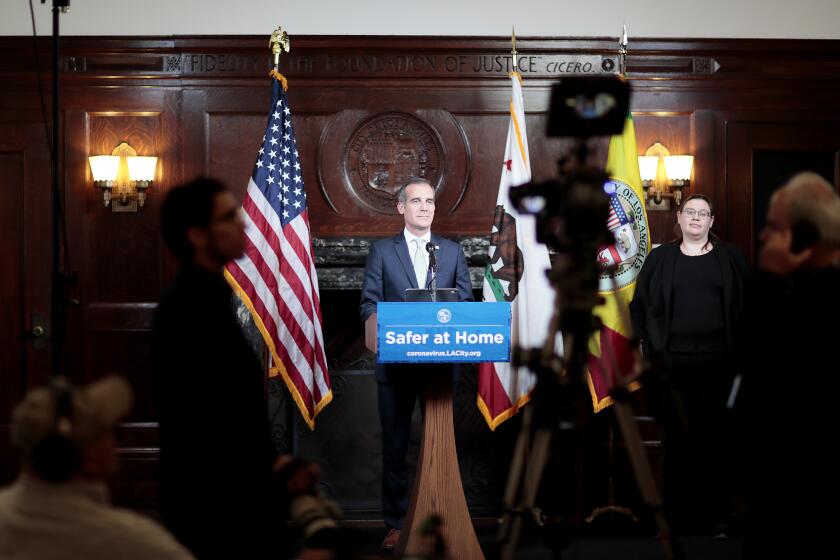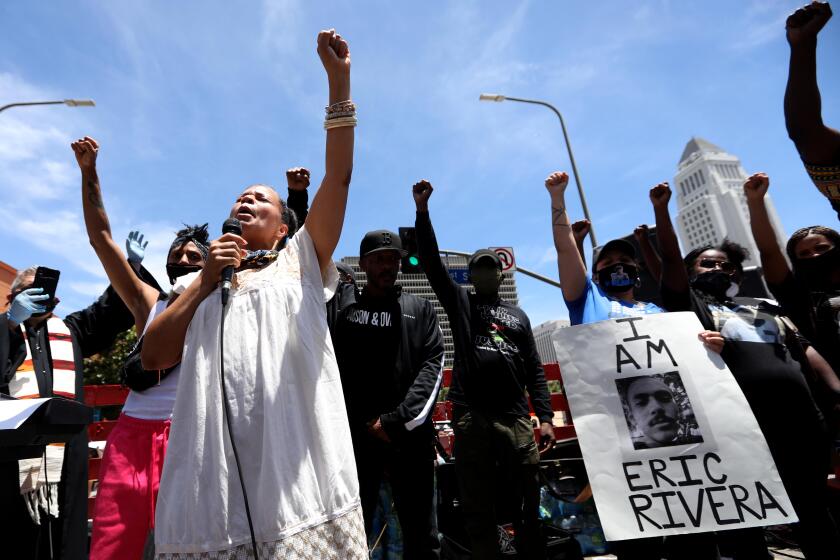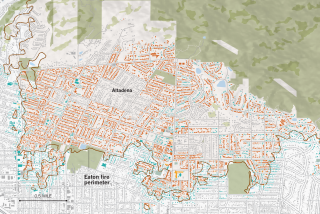Garcetti under fire for handling of police brutality protests
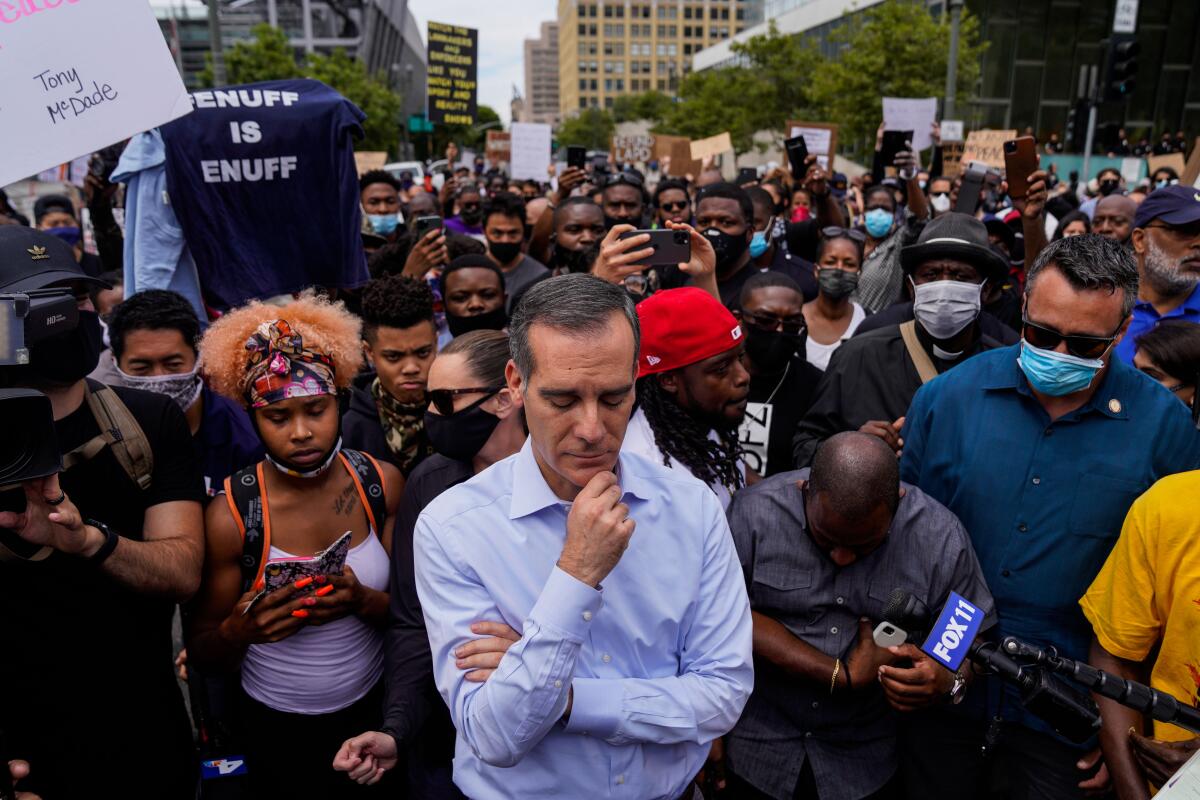
- Share via
The police union has called him unstable. Activists accuse him of supporting racist institutions. Even longtime allies said his decisions during the recent protests over police brutality hurt Los Angeles’ communities of color.
Mayor Eric Garcetti’s handling of the demonstrations and his subsequent actions drew criticism from an array of groups, wide pushback unseen during his seven years leading the city.
Garcetti, known for avoiding political risk, has appeared at times whipsawed by the protests and their aftermath.
“When you’re being fired on politically from all sides, not sure exactly how to move because you know you can’t make everybody happy?” said Isaac Bryan, director of the Black Policy Project at UCLA. “I can imagine that’s a frustrating place for him.”
As police and demonstrators clashed in the Fairfax district last month, Garcetti said he didn’t plan to request the National Guard. Hours later, he did. Angering the police union, he unveiled plans to cut the Police Department, after defending its size days earlier.
In his nightly coronavirus briefings, Mayor Eric Garcetti has struck a tone that is one part stern dad, one part life coach, with a hint of Marianne Williamson.
His initial comments about police officers showing restraint at the demonstrations incensed protesters who’d seen police using batons and foam projectiles.
And as National Guard Humvees rumbled into downtown L.A., business leaders were grateful, but questioned why police were not better able to stop the burglaries earlier.
Garcetti, in an interview, said he was focused on Angelenos’ safety.
“My first responsibility is to protect lives before everything else,” Garcetti said. “Which is why the Black Lives Matter moment is so important to me, but also why it’s important for me to make sure that our peace officers and our National Guard are in places where lives are saved. And knock on wood, thank God, we didn’t lose a life.”
Of the criticism of him, he said, “You have to listen to those words, not necessarily dismiss them just because you don’t like how they’re being delivered. It’s tough as a human being, but it’s necessary as a leader.”
Garcetti is far from the only politician to find himself struggling to navigate the rapidly changing political waters sparked by the police killing of George Floyd.
New York City Mayor Bill de Blasio was heckled when he spoke at a Brooklyn gathering to remember Floyd, and Minneapolis Mayor Jacob Frey was booed at a rally after refusing to commit to get rid of that city’s Police Department.
Criminal justice reform was already gaining traction before the massive protests. But until Floyd’s death, Black Lives Matter in Los Angeles was far from a dominant political force, as activists protested outside Garcetti’s house and at police commission meetings, and called for defunding the police and department reforms.
Now, those positions have entered the mainstream, forcing Garcetti and other political leaders to react.
Before the demonstrations, Garcetti had won praise for his calm leadership during the COVID-19 pandemic. The mayor, who spent nearly two years floating himself as a possible presidential contender, also has been in the national spotlight as he vets running mates for presumed Democratic presidential nominee Joe Biden.
Aides to Garcetti argue his actions helped control the city at a volatile moment and there was far less damage than during the 1992 riots, when more than 60 people died as violence ravaged the city.
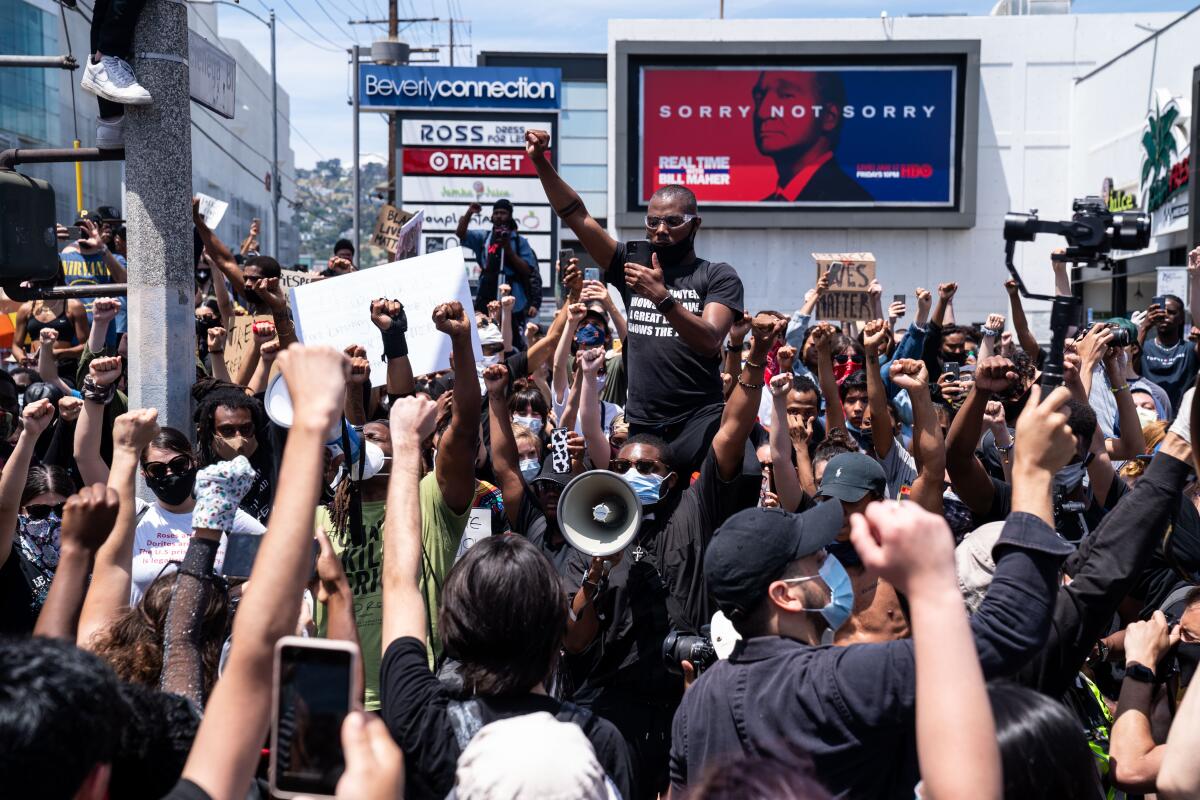
Cynthia McClain-Hill, a former Garcetti appointee on the police commission and a current Department of Water and Power commissioner, said she understands the protesters’ anger, which she called “righteous.”
“But I don’t see it as something that’s necessarily on Eric Garcetti,” she said. “The mayor is part of the structure of government and all of government bears some responsibility for institutional racism.”
Others said Garcetti missed his moment to lead. Groups that included Community Coalition and Los Angeles Alliance for a New Economy told the mayor in a June 3 letter that he’d had an opportunity to allow communities to come together to grieve after Floyd’s death amid the COVID-19 pandemic.
“Instead, under your leadership, the city chose to further escalate tension and police violence,” the letter said, adding that the curfews and police actions against protesters “have deepened the hurt and mistrust within Black, Indigenous and people of color communities.”
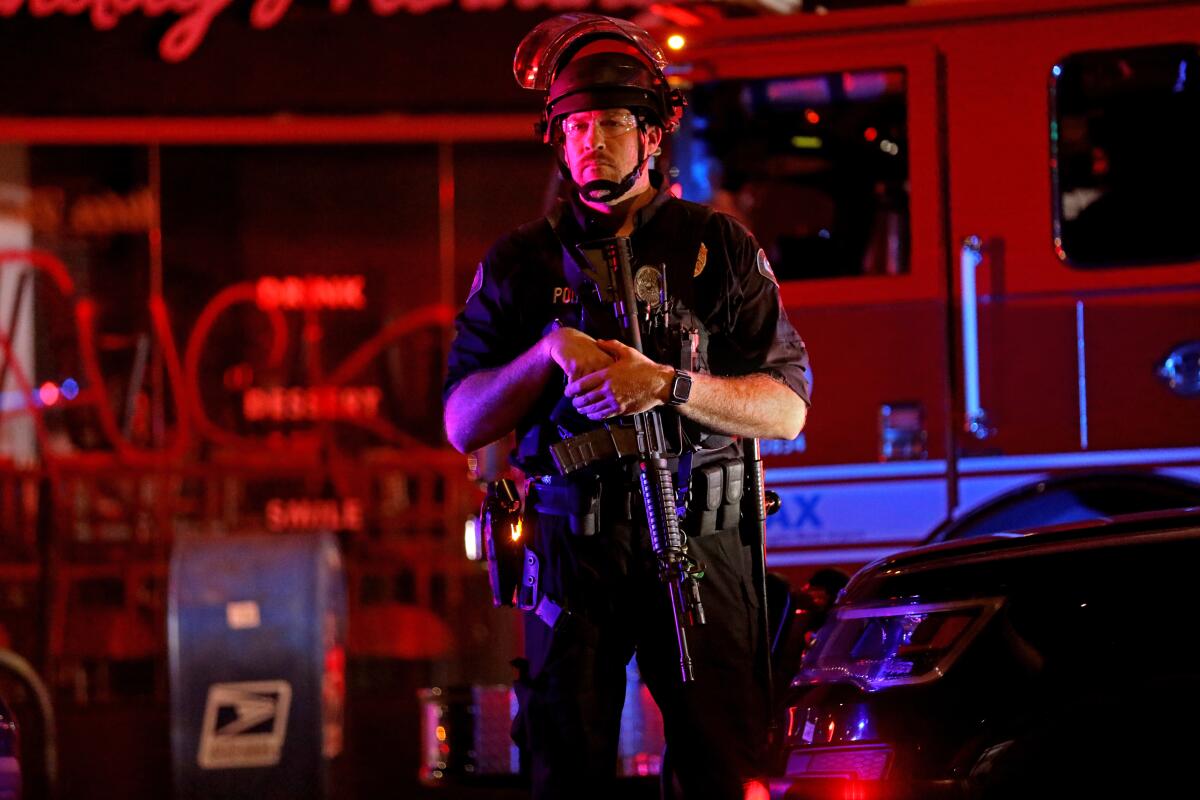
This is not the first time city leaders have been widely challenged to address policing.
Back in the 1980s and early 1990s, City Hall was criticized for failing to address widespread evidence of police brutality and racist behavior during the reign of Los Angeles Police Chief Daryl Gates.
Gates brought paramilitary-style policing to minority neighborhoods and was derided over his 1982 suggestion that more Black people died in chokeholds because the “veins or arteries of blacks do not open up as fast as they do in normal people.”
Gates and Mayor Tom Bradley clashed, but city leaders failed to oust the chief, even after the video of white officers beating Black motorist Rodney King made international headlines. Gates, whose job was protected by civil service regulations, left only after the 1992 L.A. uprising, when his department faced criticism for its failure to respond.
Bradley also found himself on the defensive after the 1992 uprising. The mayor said he’d been assured by top police officials that LAPD was prepared for any demonstrations, and said he was stunned by the extent of the rioting. It was only after Gates’ departure that the city embarked on serious reforms at the LAPD.
Garcetti said in an interview that he got on the phone with various groups immediately after Floyd was killed in Minneapolis.
As protests broke out, the city mobilized, but Garcetti said he didn’t anticipate the burglaries that occurred on the afternoon of May 30, the day he requested the National Guard. Dozens of businesses were burglarized and vandalized that day and night.
Police have said those crimes were not directly related to the organized protests, which were peaceful.
There were also several disturbing incidents caught on video of LAPD officers using batons and less-than-lethal weapons on protesters. As of last week, 10 Los Angeles police officers had been taken off the street and assigned to desk duties pending investigations. The department has also received about 40 complaints of officers using excessive force and Garcetti could face calls for police reforms in light of how protesters were treated.
Danny Bakewell, the executive publisher of the L.A. Sentinel and chairman of the civil rights group Brotherhood Crusade, witnessed the 1992 riots and watched as demonstrators again took to the streets in recent weeks.
Although Bakewell said he didn’t support Garcetti’s decision to ask for the National Guard, the mayor “did what he thought he had to do to make sure that his city didn’t get away from him,” he said. He praised the mayor, saying Garcetti ultimately helped facilitate peaceful protests.
“The looting stopped and the protests continued on. And the message was clear: We don’t want heavy-handed police officers,” Bakewell said.
“It blew up very, very fast,” said UCLA’s Bryan, who demonstrated at Fairfax Avenue and 3rd Street and is critical of the police’s actions toward demonstrators that day. Bryan, who worked at City Hall, questioned whether the mayor’s office has ties to activist groups, which he suggested could have helped the city more effectively respond to the protests.
“The only way to know how to move is to have folks close to you that are also close to community movement, who can be honest with you about the things that people are feeling and needing,” Bryan said.
With Melina Abdullah and Patrisse Cullors playing key roles, Black Lives Matter has transformed from a small but passionate movement into a cultural and political phenomenon.
Garcetti, in an interview, said his office does have those relationships. Some activists have traditionally declined an offer to come to City Hall, he said.
He’s also faced calls to fire LAPD Chief Michel Moore over his comment that looters were as responsible for Floyd’s death as the Minneapolis police officers. Moore apologized for his remark and Garcetti has stood by the chief.
At the same time, the mayor has portrayed the LAPD as a leader on policing, pointing to the body cameras worn by officers and the implicit bias training they undergo.
Garcetti said there’s “plenty of time to review” decisions over the last month, but added that he was too busy “looking at how we can be brave and reframe our budget” amid calls to redirect money toward communities of color.
More to Read
Sign up for Essential California
The most important California stories and recommendations in your inbox every morning.
You may occasionally receive promotional content from the Los Angeles Times.
